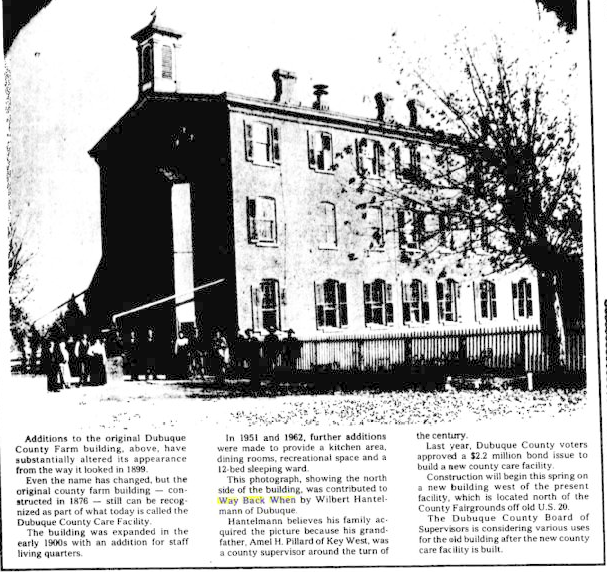Encyclopedia Dubuque
"Encyclopedia Dubuque is the online authority for all things Dubuque, written by the people who know the city best.”
Marshall Cohen—researcher and producer, CNN
Affiliated with the Local History Network of the State Historical Society of Iowa, and the Iowa Museum Association.
JULIEN CARE FACILITY
Julien Care Facility. Originally established in 1848 in a log cabin eight miles outside Dubuque, the institution allowed residents to work for their keep. The facility has had several locations. In 1857 a second home called the "House of Refuge" was built northwest of the city on land later developed by the DUBUQUE SHOOTING SOCIETY. That facility was destroyed by fire in 1875. (1) Support of the facility was then the responsibility of the City of Dubuque. In need of money itself, the city began demanding that the facility should be supported by the county.
The Board County Board of Supervisors in March 1876, purchased from the estate of W.H. McNear what was known as the J. P. Farley farm. (2) The two hundred acre site near Julien Station cost $10,000. In May thirteen bids were received for building the new facility. The lowest bid came from HEER & NAESCHER for $10,500. (3) Residents were temporarily housed on the site and began farming. Construction of the foundation began on June 1st. The permanent building, 69' x 35'and three stories high with rooms for forty-eight people, was finished in October 1876. By June 1877, the farm had sixty-six residents including five children. The number of residents increased to seventy-four by 1880 when the weekly average cost of maintenance including food and clothing per person was $1.67.
The farm was rented out during 1876 with sixty acres reserved to raise vegetables for the use of the home. The Dubuque Herald reported in October that 400 bushels of potatoes, cabbages and other vegetables had been harvested and fifty head of hogs provided all the meat needed. Thirty acres had already been tilled for the next year's crops. (4)
Concern about the cost of the operation led the board of supervisors to adopt the rule that financial relief would not be given if there was an able-bodied adult at home. In May 1877 there were 97 adults and 225 children in need of support. (5)
In 1917 concern for the poor led to a surprise visit by members of the DUBUQUE FEDERATED WOMEN'S CLUB. Finding the residents poorly cared for and living in filthy conditions, the community took action. Repairs were made and the rooms were disinfected and painted. By 1933, the farm consisted of 240 acres of land of which 160 were being cultivated. Conditions again deteriorated; changing state rules resulted in the facility becoming more of a care provider. While older residents continued to live there, new residents often knew nothing about farm work.
In 1975 the Supervisors succeeded in getting a bond issue passed to build a new $2.2 million care facility. In 1978, a new building capable of serving 120 people was opened. The farm machinery was sold; the land was leased. In late 1986, faced with losing money on the new facility, the Supervisors leased it to The Gannon Center for Community Health for use with mentally handicapped and mentally ill patients. (6)
On January 1, 1986, the operation of the home became an affiliation of the GANNON CENTER. The facility was named the Julien Care Facility. In 1997 the medical director of the Gannon Center made regular visits to patients, counseling and vocational services were available, and residential nursing services were provided twenty-four hours daily. The land once used by the "Poor Farm" was sold to the City of Dubuque in 1997 to be used as an industrial park.
Due to financial problems, the Gannon Center, which operated the facility for twenty years, ceased most of its operations around 2016, but agreed to continue running the facility until a replacement could be found. (7)
The announcement was made on June 8, 2006 that Dubuque County had agreed to hire Developing Alternative Choices Inc. (DAC) to operate the care facility. DAC provided residential and vocational services to its clients and employed about 135 people. It had a $4 million budget and operated a 12-bed intermediate care facility for mentally disabled clients in addition to providing vocational services weekdays for about ninety people. The company owned several properties to provide 24-hour home and community-based services. The company also owned A-DAC Plastics Inc. which employed about one hundred people in Maquoketa. (8)
The transition would be made on June 20th. The Maquoketa-based business at the time offered residential care for an estimated 60 people with mental illness. DAC retained Ann Hoff, the facility administrator and some of the other fifty employees. Anyone active in the union representing Julien Care employees became a DAC employee while others would be interviewed. Employees would either maintain their current wage or, if they made less than $8.25 per hour, would have their wage raised to that amount. (9)
The 1989 through 1993 Dubuque City Directory listed 13066 Seippel Road.
---
Source:
1. "Another Conflagration," Dubuque Herald, November 23, 1875, p. 4. Online: https://news.google.com/newspapers?nid=uh8FjILnQOkC&dat=18751123&printsec=frontpage&hl=en
2. "The Poor," Dubuque Herald, October 21, 1876, p. 4. Online: https://news.google.com/newspapers?nid=uh8FjILnQOkC&dat=18761021&printsec=frontpage&hl=en
3. "New County Poor House," Dubuque Herald, May 11, 1876, p. 4. Online: https://news.google.com/newspapers?nid=uh8FjILnQOkC&dat=18760511&printsec=frontpage&hl=en
4. "The Poor,"
5. "Special Poor Relief," Dubuque Herald, May 2, 1877, p. 4. Online: https://news.google.com/newspapers?nid=uh8FjILnQOkC&dat=18770502&printsec=frontpage&hl=en
6. Bergstrom, Kathy. "Julien Care Workers Walk Picket Line," Telegraph Herald, August 18, 1993, p. 3A
7. Klein, Emily, "DAC Inc. To Take Over Julien Care," Telegraph Herald, June 8, 2006, p. 5
8. Ibid.
9. Ibid.


